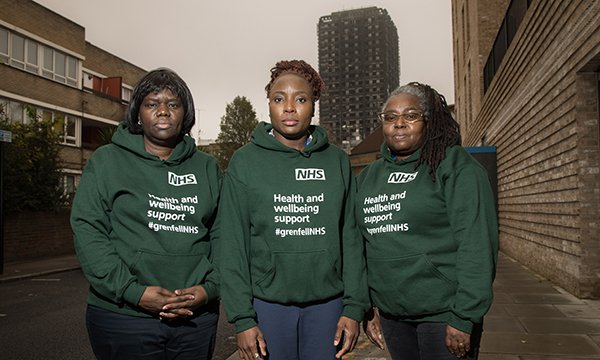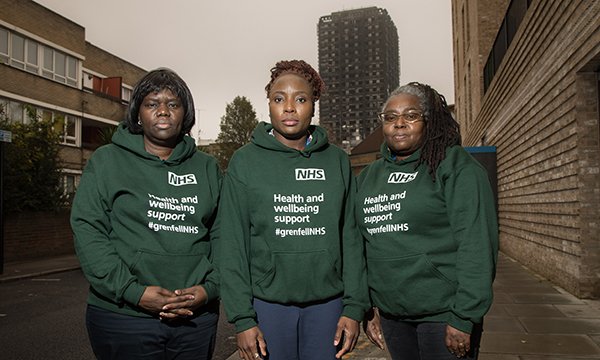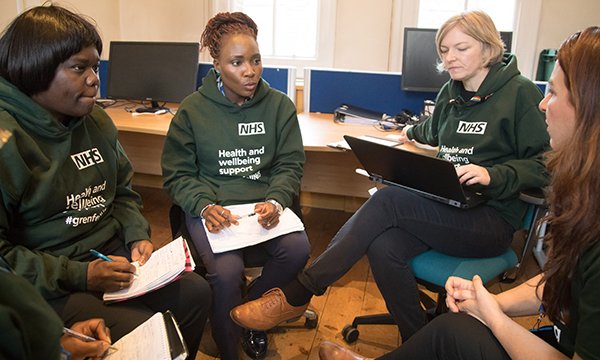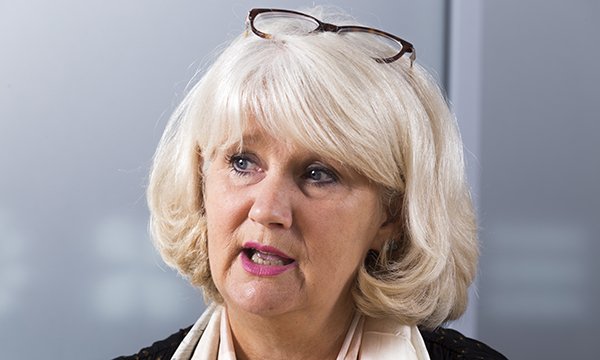Grenfell: The team bringing hope of recovery to the community

A nurse-led mental health outreach team is working day and night to support a population overshadowed by tragedy
- 11,000 people may be at risk of PTSD as a result of the fire
- Door to door outreach in the immediate aftermath has given way to a screen-and-treat approach
- This ‘assertive care’ model could become a template for post-disaster community outreach
Whether joining families out trick or treating, sitting in a mosque at 3am or standing shoulder to shoulder in silence at Notting Hill Carnival, the Grenfell outreach team has been there for its west London community.
Members of the nurse-led team readily admit they have done some very unusual things in this job – but this is no ordinary situation and there is no protocol.

Picture: Barney Newman
Almost six months since the Grenfell Tower fire, the 22 members of the team remain a familiar sight on the streets around the Lancaster West estate.
The burnt-out shell of the 24-storey tower block still stands following the 14 June fire, which killed 71 people, including a baby who was subsequently stillborn.
A dedicated team with local knowledge
The NHS Grenfell outreach team was put together by Central and North West London NHS Foundation Trust (CNWL) in the immediate aftermath of the fire. Half of the team came from the area, including therapists who speak some of the many languages spoken locally, such as Farsi and Moroccan Arabic.
The team’s members try to be wherever someone may need them, whatever hour. They have worked hard to build relationships with local people, not always easy in a community where there is anger towards and mistrust of authority.
11,000
The estimated number of people who may be affected by the fire and its aftermath
As they walk down Latimer Road, where eulogies to lost lives and Justice for Grenfell campaign banners hang from the railings, people stop to chat.
‘If trauma goes untreated, it will get worse’
Outreach team manager and nurse Emma Kennedy says the team’s biggest task has been tracking down the 11,000 people who may be affected by the tragedy to offer them screening for post-traumatic stress disorder (PTSD).
‘Our greatest job is to ensure we have contacted all of them and asked them if they want screening,’ Ms Kennedy says. ‘If we miss someone’s trauma and don’t treat it, it will get worse.’
Huge numbers of people were displaced by the fire, including refugees from Syria and Eritrea who had fled conflict and would ordinarily present with complex PTSD. There was a high proportion of people with mental health difficulties in the area even before the fire.
An evolving approach
So far, the team has had 4,082 contacts with people since the fire. They knocked on every door in the immediate area in the first month following the tragedy, giving mental health first aid – advising on ways to sleep better, eat well and feel less anxious, and when to seek healthcare. After three months, they moved on to a screen-and-treat programme for PTSD.
Three quarters of residents on the Lancaster West estate have PTSD, as do 40% of the 1,000 people living in its immediate vicinity. Screening will continue to spread out across north west London ‘until we find no more cases of PTSD related to Grenfell’, Ms Kennedy says.

Picture: Barney Newman
Strong rapport with the community is at the heart of their approach.
High visibility jackets with ‘NHS’ emblazoned on them – worn in the early days to make residents aware that the team members were there to help – have given way to more subtle approaches.
Team senior practitioner and nurse Alison McKenzie says: ‘We had to take “mental health” off our badges because people were worried about what their friends, neighbours or families may think.
75%
of the Lancaster West estate’s residents have PTSD
‘We are here very much to look after their emotional well-being and resilience so they don’t require intervention from secondary services.’
Outreach worker Sandra Ifidon Osagiede, who lives in the area, agrees. She is a mental health nurse by background but does not use the term, to avoid the issue of stigma.
Grenfell chief psychologist John Green says one of the great strengths of the team’s nursing staff is their ability to handle whatever is presented to them, even at 1am in the underpass of the Westway, the elevated arterial road that runs beside the estate.
‘Having nursing staff who really know what they are doing and are really experienced has been absolutely crucial in driving the programme’
John Green
‘In many ways this is a free-form situation in the sense you don’t know what’s going to happen next, you don’t know who you are going to meet, what they are going to need. You can’t have a protocol for everything,’ he says.
‘Having nursing staff who really know what they are doing and are really experienced has been absolutely crucial in driving the programme.’
Stigma, denial and cultural awareness
Trust chief executive Claire Murdoch, who is also NHS England national mental health director and a registered mental health nurse, has been helping to build relationships with local faith leaders.

She says there is mutual respect for what the other is doing – the Al Manaar mosque has employed its own psychiatrist and the outreach team does a nightshift there too. The trust is also providing training for about 40 community workers so that they can carry out PTSD screening.
A large percentage of people affected by the fire, particularly those living in the tower, were Muslim, Ms Murdoch points out.
300
people are seen by the team in the community every week
‘For some cultures, there’s barely even a word for mental health and, for some people, we have been aware that they have presented with physical symptoms that indicate mental distress,’ she says.
‘It’s much more acceptable to talk about not being able to sleep or “my chest – I can’t breathe properly. Is it the fire?”.
‘There’s stigma and denial about mental health. It's about meeting people on their terms and working with communities.’
‘We tell people they can survive this’
The outreach workers see about 300 people each week in the community, visit between 20 and 50 homes a day for ‘street screening’ and attend hotels where many survivors are still living.
Ms Kennedy says she has heard people say they are ‘broken’ and she has been told ‘you can’t fix me’, but she believes they can.
She says often in mental health services people are told they do not have to put a brave face on.
‘In this situation, you have to say to people you do need to be strong. You have to get through this. You have to survive. You have to put on a brave face and survive.’
- RELATED: Grenfell case study – Screening local residents for symptoms of post-traumatic stress disorder
Ms McKenzie adds that much of the team’s work is health promotion, helping people manage and assuring them that they can recover.
She recalls the story of a man who came into The Curve, the Grenfell Assistance Centre where the team provides emotional support.
Ms McKenzie says: ‘He was really disturbed by the thought that he would never get over this.
‘I spent some time talking about the difference between never forgetting and never getting something out of your head, and the way we process trauma.’
‘A week or two in we were saying this is unique, certainly in this country’
Claire Murdoch
Dr Green says it is very unusual to have such a concentration in a single area of people affected by a major incident.
‘Buildings near Grenfell were bombarded by the burning debris and smoke, which we know is associated with a high rate of trauma.’
He adds: ‘If you look out the windows of Grenfell Tower, which I have done since the fire, there are tower blocks for as far as the eye can see, so a large part of London actually witnessed the fire.’

Ms Murdoch adds: ‘That sort of exposure to such a long trauma and some of the dreadful things that happened during the burning of that tower – people falling from the building, the phone calls. We realised it was extraordinary at the time, but it was a week or two in before we were saying this is unique, unique in this country certainly.’
Since the fire, Ms Kennedy has seen symptoms of trauma that she has rarely seen before in a long career.
‘I hope the care we’re providing will become a model for any disaster’
Emma Kennedy
‘I have done 20 years managing teams, seeing clients, being a nurse and I have seen it once – in a forced migration trauma service. Within three months of working here, I saw someone go completely blank in front of me and disassociate.
‘She was not there – and cannot remember it – it was really upsetting to see that.’
The team hopes the care it is providing will not just help this community but it will provide a model for the future.
The outreach workers are collecting data as they go, with patient consent.
Ms Kennedy says: ‘The outcome measure is that the community has healed. Then we can present it as a model for any disaster – and I hope that does happen.’
Painful work – but satisfying
She believes that this ‘assertive’ model of care, where the service comes to people in need, already has the potential to reduce health inequalities in the area around Grenfell on a wider, larger scale.
Ms Murdoch also hopes there is some good to come out of the tragedy.
‘We wish we weren’t doing this work. It’s painful work. It’s sad work.
‘There’s not a single one of us that doesn’t still weep, and so we are not celebrating this. It’s about the satisfaction of meeting a need and our very great wish that our skills and expertise can translate into good.’
She adds that it is also about creating ‘this longer-term model of care for the future where we’ve all learned and we build strength and resilience with people – not for them’.
More in this series – Grenfell: six months on
- Timeline – Charting the healthcare response
- Case study – Screening local residents for symptoms of post-traumatic stress disorder
- Podcast – On site at Grenfell
- Nurse-led response – Finding and treating the bereaved and the witnesses
- Care contacts – Residents’ contacts with the NHS
- Gallery – 6 months on in pictures
Find out more
If you feel personally affected by the Grenfell Tower tragedy, you can call the NHS Single Point of Access service on 0800 0234 650. Let the operator know you are calling as a result of the Grenfell fire. Alternatively, you can email cnw-tr.spa@nhs.net

